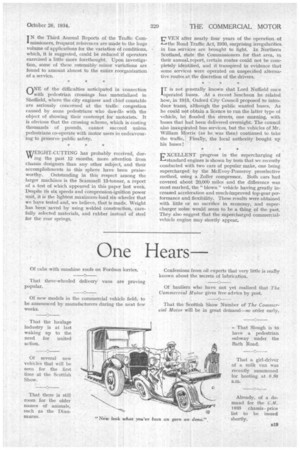Passing Comments
Page 32

Page 33

If you've noticed an error in this article please click here to report it so we can fix it.
HAULIERS engaged in the conveyance of sugar"beet should again take warning that it is necessary for them to be careful in loading the beet that there is no risk of any of it tumbling off the vehicle en route. A lorry driver in Suffolk has recently been fined 10s. because his load was inefficiently packed so that several beet fell on the highway.
IN some rural areas, difficulty is still experienced in
impressing upon bus operators the need for efficient time-keeping. In one case, a constable was endeavouring to reason with a driver who had not departed according to schedule, when an elderly woman who was about to enter the bus begged the driver to wait for 10 minutes while she returned home for something she had forgotten! COACH and bus operators have the doubtful satisfaction of knowing that the railways are benefiting from the suppression of road transport. During the three months from July-September, the passenger revenue of the Great Western Railway Co. increased by £24,000, as compared with the figure of a year earlier, a result which is said to have surpassed expectations.
OWING to the 41-ton weight restriction on the Menai Suspension Bridge, serious inconvenience is caused to hauliers. Furniture piled up on the Carnarvonshire side of the bridge, recently, told its own tale. The van, with its contents, exceeded 4i tens, and, therefore, could not cross the bridge. Articles of furniture were then taken out. T N the Third Annual Reports of the Traffic Commissioners, frequent references are made to the huge volume of applications for the variation of conditions, which, it is suggested, could be reduced if operators exercised a little more forethought. Upon investigation, some of these ostensibly minor variations are found to amount almost to the entire reorganization of a service.
ONE of the difficulties anticipated in connection with pedestrian crossings has materialized in Sheffield, where the city engineer and chief constable are seriously concerned at the traffic congestion caused by some pedestrians who dawdle with the object of showing their contempt for motorists. It is obvious that the crossing scheme, which is costing thousands of pounds, cannot succeed unless pedestrians co-operate with motor users in endeavouring to preserve public safety.
WEIGHT-CUTTING has probably received, dur" tug the past 12 months, more attention from chassis designers than any other subject, and their accomplishments in this sphere have been praiseworthy. Outstanding in this respect among the larger machines is the Scammell 13-tonner, a report of a test of which appeared in this paper last week. Despite its six speeds and compression-ignition power , unit, it is the lightest maximum-load six-wheeler that we have tested and, we believe, that is made. Weight has been saved by using welded construction, carefully selected materials, and rubber instead of steel for the rear springs.
VEN after nearly four years of the operation of 4"4 the Road Traffic Act, 1930, surprising irregularities. in bus services are brought to light. In Northern Scotland, state the Commissioners for that area, in their annuaL report, certain routes could not be completely identified, and it transpired in evidence that some services were operated on unspecified alternative routes at the discretion of the drivers.
TT is not generally known that Lord Nuffield once 'operated buses. At a recent luncheon he related how, in 1913, Oxford City Council proposed to introduce trams, although the public wanted buses. As he could not obtain a licence to run the latter type of vehicle, he flooded the streets, one morning, with buses that had been delivered overnight. The council also inaugurated bus services, but the vehicles of Mr. William Mprris (as he. was then) continued to take the traffic. Finally, the local authority bought up his buses !
EXCELLENT progress in the supercharging of "-Astandard engines is shown by tests that we recently conducted with two cars of popular make, one being supercharged by the McEvoy-Pomeroy preselective method, using a Zoller compressor. Both cars had covered about 20,000 miles and the difference was most marked, the " blown " vehicle having greatly increased acceleration and much-improved top-gear performance and flexibility. These results were obtained with little or no sacrifice in economy, and supercharger noise would seem to be a thing of the past. They also suggest that the supercharged commercialvehicle engine may shortly appear,




























































































